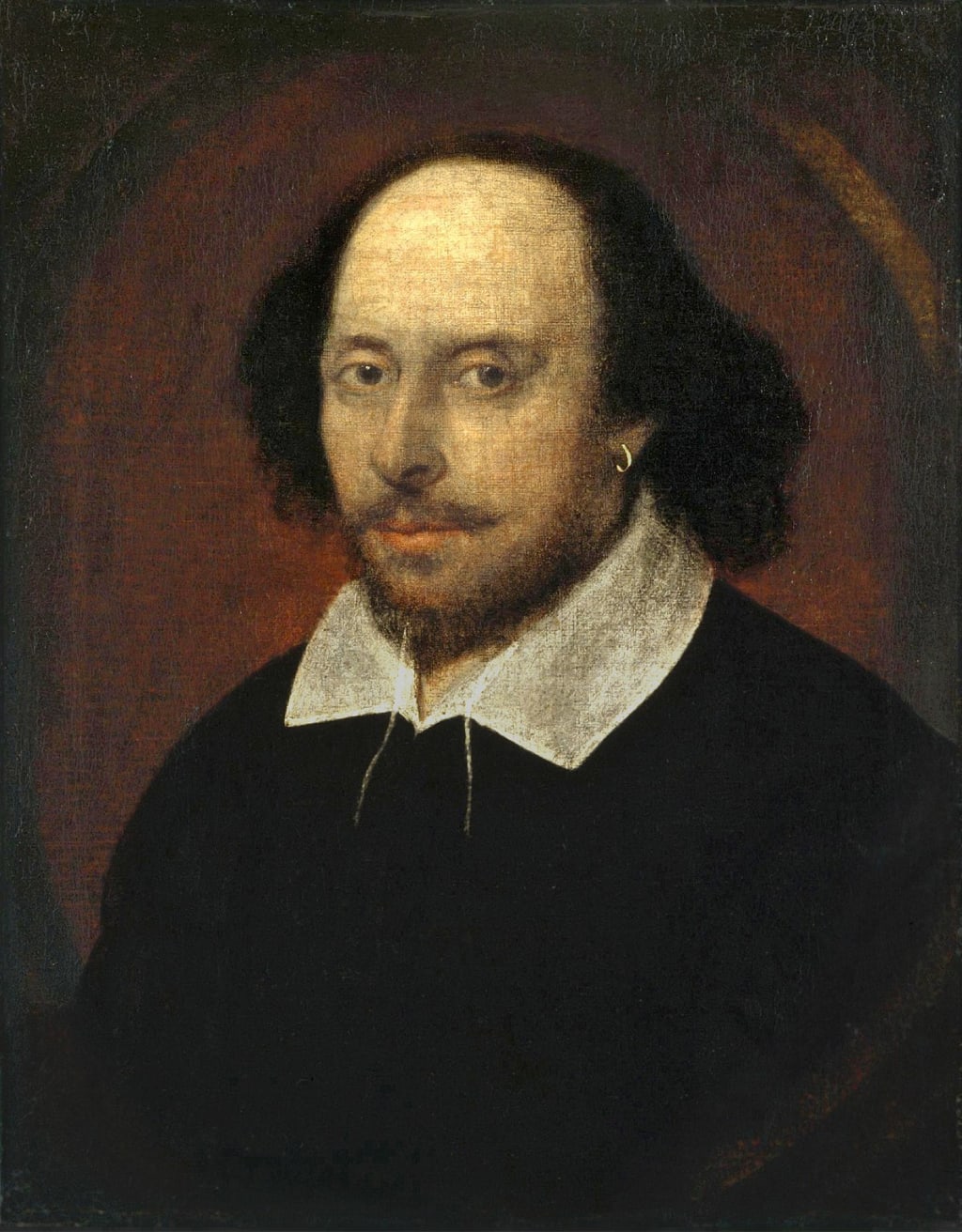Ex Machina and Appropriating Shakespeare
Shakespeare and the Appropriation of Literature

The contemporary world has inadvertently collected political, religious, and social suggestions from William Shakespeare. Due to being regarded as one of the greatest dramatists who ever lived, coupled with effusive adoration for authoring myriads of socially relevant plays, William Shakespeare’s work has become stripped, reformed, and relentlessly but discreetly gyred into other mediums by many artists. According to the treatise on Shakespeare’s appropriated work, Shakespeare and the Ethics of Appropriation edited by Alexa Huang and Elizabeth Rivlin, William Shakespeare should not be subjected to victimization by the seemingly unethical appropriations, rather the work provides agency and ethical context to another society, allowing the appropriators to bear the fruit of Shakespeare’s labor.
“Precisely because appropriation carries strong overtones of agency, potentially for the appropriated as well as for the appropriator, it can convey political, cultural and in our contention, ethical advocacy.”
Within appropriated works, “overtones of agency” allows appropriators to utilize other mediums as a conduit to “conveying political and cultural advocacy” which extends the relationship of Shakespeare to another audience and remakes the viewers' opinions who have become ensnared by the work. An example of this appropriation in Shakespeare is in Alex Garland’s 2014 film, Ex Machina which appropriates Shakespeare’s Macbeth due to its ability to extend information to another world but simultaneously operates as an authentic voice.
The Scottish tragedy, Macbeth authored by William Shakespeare tells the tale of a soldier who attempts regicide after learning by three prophesying witches of his probable kingship. Adaptation, Appropriation, or What You Will authored by Christy Desmet and Sujata Iyengar addresses appropriation similar to Shakespeare and the Ethics of Appropriation.
“To appropriate Shakespeare is to make it part of one’s own mental furniture as well as to extend the solitary self out towards the broader world of Shakespeare and what Shakespeare touches.”
According to Desmet and Iyengar, appropriation is utilized to advocate the social and political life of another world and what “Shakespeare touches” can be seen as the altered work like Ex Machina. Macbeth extends to the “broader world” through the film Ex Machina. The film centers on Caleb, a computer coder invited to spend time with a praised genius named Nathan in his isolated home. He soon interacts with an Artificial Intelligence named Ava, created by Nathan and subjects her to the “Turing test” which questions Ava, attempting to prove that she is truly Artificial Intelligence. If she passes the test, it infers that she perfectly exudes empathy and thoughts similar to a functioning human. It is later revealed that the test was for Caleb and the semantics allowed Ava to utilize her sexuality, thought, and empathy to escape, proving to be a “true A.I.”
These tactics of manipulation wrought through Ava’s desire to free herself can be reflected in Macbeth. Adaptation, Appropriation, or What You Will collects historical contingencies to support appropriation as a theory that involves more than “thievery,” “borrowing,” or “gifting something” but instead, it includes agency. Ex Machina “borrows” characters like Ava and plot points like the manipulation found in the third act from Shakespeare but utilizes it as something more than the intended text. Within the play, Lady Macbeth manipulates her husband into committing regicide by insulting his masculinity. This is reflected in the third act of Ex Machina after Ava manipulates Caleb into helping her escape. Lady Macbeth’s means of manipulation involves belittling Macbeth.
“Come, you spirits / That tend on mortal thoughts, unsex me here, / And fill me from the crown to the toe topful / Of direst cruelty!”
Lady Macbeth begs “unsex me here” to convey her displeasure with Macbeth’s masculinity, ultimately alluding to the desire of becoming a man so the task can be completed. Ava manipulates Caleb into helping her but also conveys a similar message of oppression through visual means as she is physically enclosed in a glass room, only interacted with to complete Nathan’s test.

Desmet and Iyengar define appropriation from the Latin origin proprius: “To appropriate something is to make it one’s own, part of oneself, not just one’s property.” Appropriating can be visualized as evolving pieces or “making it one’s own” from another man’s work but maintaining a separation; therefore, denying it as “property.” The process of “making it one’s own” can be seen in Garland’s original plot involving advancing technology rather than reviving Shakespeare’s era and exact plot. William Shakespeare gifts Garland with commentary about corruption of power, but the seed is grown through an original idea with modern characters comparative to Macbeth. Ultimately, Ava can be seen as a reflection of Lady Macbeth and Caleb can be seen as a character laced in similarities to Macbeth.
Caleb’s character is crafted in the likeness of Macbeth. An example of the colliding characters can be seen in the character’s demise:
“She should have died hereafter: / There would have been a time for such a word. / Tomorrow and tomorrow and tomorrow, / Creeps in this petty pace from day to day / To the last syllable of recorded time / And all our yesterdays have lighted fools / The way to dusty death. Out, out, brief candle! / Life’s but a walking shadow, a poor player / That struts and frets his hour upon the stage / And then is heard no more. It is a tale / Told by an idiot, full of sound and fury, / Signifying nothing.”
Macbeth explains that he has lost everything and regrets striving for the throne by attempting regicide. Ultimately, he laments on the uselessness of his desires and claims life is a “…tale / Told by an idiot.” Macbeth’s death is paralleled with the conclusion of Ex Machina; Caleb is entrapped in the recluse home of Nathan tearfully aware of his mistake of falling victim to Ava and the Turing test.
Appropriating an original work through film means garnering tactics of the medium. As film is a means of visual story-telling, the final product must be something that appropriates the original work through filmmaking techniques involving mise-en-scene, editing, color, set design, dialogue, camera movement, and framing. Caleb is a redressed form of Shakespeare’s Macbeth proven in his eventual corruption (Caleb’s desire to overthrow Nathan to selfishly be with Ava). Through editing, Caleb reveals his attraction to Ava, which ultimately solidifies the manipulation of him by Ava and alluding to his eventual desire to escape with her. During the film, Caleb watches Ava undress; The camera focuses on her undressing then cuts to his throat gulping, recutting to her undressing, then cutting to his hands touching the screen from where he watches her. Through editing, the audience can understand that Caleb is entranced with Ava, but it isn't until later that the viewer is unaware of her intentional manipulation. Through film technique, Caleb appropriates Macbeth’s character.
William Shakespeare’s plays have been relevant for over 400 years. After being stripped and remade by another artist’s labor like in Ex Machina, Shakespeare’s work can be found across borders of different countries and understood by non-western audiences. Shakespeare and the Ethics of Appropriation describe the social and political relevance of Shakespeare’s text which conveys the significance of appropriation. Ultimately, appropriation of Shakespeare’s plays does not belittle his work but advocates for political, social, or religious significance in another world.
“By giving expression to marginalized, oppressed, and disenfranchised cultural voices, Shakespeare becomes a vehicle of empowerment, an agent to foster the multicultural good.”
In Ex Machina, the cultural advocacy or “vehicle of empowerment” is found in Ava who is dressed in the likeness of Lady Macbeth. To the contemporary viewer, Lady Macbeth’s manipulation of Macbeth has evolved into Ava’s ability to pass the Turing test. This connection bridges Shakespeare’s work to the “broader world” validating the work as an appropriation.

Works Cited
Christy Desmet & Sujata Iyengar. Adaptation, appropriation, or what you will, Shakespeare, 10-19, 2015. DOI: 10.1080/17450918.2015.1012550
“Orpheus.” Poets.org, Academy of American Poets, 23 July 2015, www.poets.org/poetsorg/poet/ william-shakespeare.
Rivlin, Elizabeth J., and Elizabeth J. Rivlin. Shakespeare and the Ethics of Appropriation. Palgrave Macmillan, 2014.
Shakespeare, William. Macbeth: Folger Shakespeare Library. Washington Square Press, 1992. 11
___
As always, thank you for reading. Any and all tips are deeply appreciated :)
About the Creator
Bella Leon
Welcome to my digital diary!
I have a vast but useless knowledge of cinema, and I just love to write.
You can expect to find random articles regarding various subjects, poetry, short stories, and anything film related. Happy reading <3






Comments
There are no comments for this story
Be the first to respond and start the conversation.